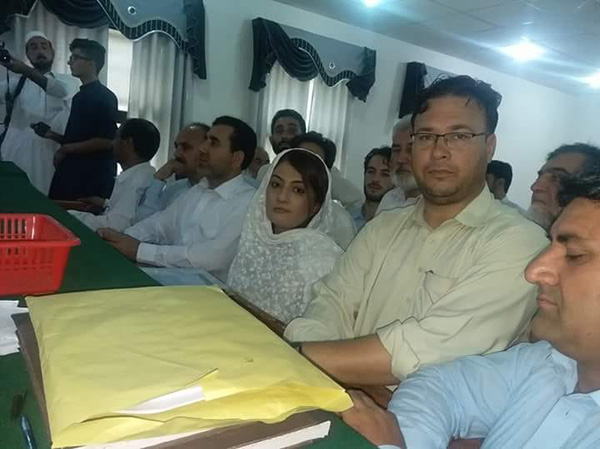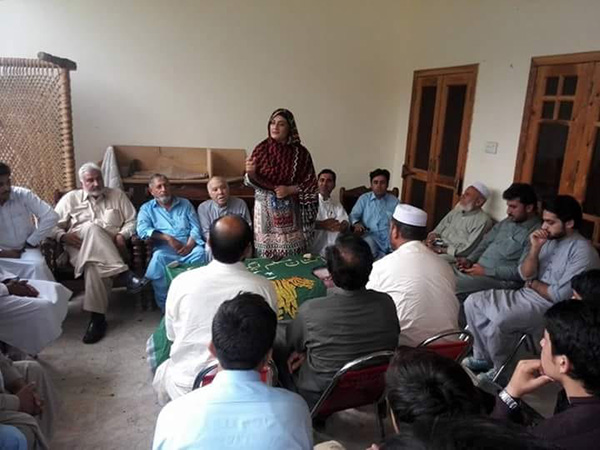Sobia Shahid and Hameeda Shahid are associated with rival political camps. Yet, they have much more in common, then just surnames. Both are working tirelessly, and against all odds, to win general seats in constituencies, where previously women have not been allowed to vote.
In May, Sobia Shahid, fielded by the Pakistan Muslim League-Nawaz, submitted her nomination papers for NA-7 (Lower Dir), located in the Khyber Pakhtunkhwa province. The last time Pakistan went to vote in 2013, this national assembly constituency was a part of NA-34, which was bagged by Shahib Zada Muhammad Yaqub of the Jamaat-e-Islami, a religious party. In the following days, as he made his way to the parliament, the Election Commission of Pakistan revealed that upward to 200,000 women were registered to vote in NA-34, yet only 231 (0.11 per cent) went to the polling booth. A written agreement later surfaced that proved that female voters had been effectively disenfranchised on the pretext of tribal traditions. Local political leaders warned men not to allow their wives, daughters, and mothers to go to a polling booth. Other reasons for the lower than usual turnout was the mountainous terrain. Polling stations and booths are usually located in far-flung areas where it is difficult for women to travel alone.

But Shahid, a former member of the Khyber Pakhtunkhwa Assembly on a reserved seat, will not be deterred. “Women want to vote in Lower Dir,” the mother of three tells Geo.tv, “They are just as politically aware as the men.” There are a total of 330,592 registered voters in NA-7, of which 132,050 (39 per cent) are women. That is a considerable vote bank.
“All I have to do is convince them to come out and cast a ballot, even if not for me.” Her main opponent is Jamaat-e-Islami’s chief Siraj ul Haq.
Not far from NA-7, is Hameeda Shahid’s constituency. Winning is an uphill task for her as well. She is set to contest on a Pakistan Tehreek-e-Insaaf ticket for the provincial assembly seat of PK-10 in Upper Dir, a region also considered the stronghold of Jamaat-e-Islami, which until recently had a political alliance with her party in the province. Upper Dir does not have a vastly different polling trajectory than that of Lower Dir. While PK-10 is a newly carved out constituency, in 2013 only one woman out of a total of 138,910 registered female voters cast her ballot in the NA-33 area of Upper Dir.

Shahid has been associated with Imran Khan’s PTI since 2011. She previously served as the president of the provincial sports wing of the party. Her husband is a customs official and her father, a former parliamentarian, is a well-regarded religious scholar in the area. Yet, she has had a difficult time on the stump. Local PTI leaders have been holding media talks to convince the party’s senior leadership to take back tickets awarded to women on general seats. “After being named by my party, it is the responsibility of each and every PTI worker in my constituency to support me and my campaign,” she says, “Instead, they are working overtime to undermine me and get the ticket for themselves.”
Upper and Lower Dir are not the only areas in Pakistan where women were prevented from practising their legal right to vote last election cycle. Reports later surfaced about constituencies in Khyber Pakhtunkhwa and Punjab where very few ballot papers were stamped by women. Subsequent outrage by civil society organizations prompted the Election Commission of Pakistan and parliamentarians to take notice. Now, under the Election Act 2017, passed in October last year, for polling to be valid, at least 10 per cent of the registered female voters must cast a ballot, otherwise, results will be nullified.
The efforts have led to a turnaround in parts of Dir. In 2015, after a men-only turnout in the by-election in PK-95 (Lower Dir), the ECP binned the final result and ordered re-polling - although the decision was later suspended by the Peshawar High Court. But then, this February, the women of Dir ended a four-decade-old tradition of not voting, by coming out to stamp ballot papers in the local government by-elections.
In parts of Khyber Pakhtunkhwa and the neighbouring tribal belt, this is a monumental development. The opposition to women voting and contesting is slowly wearing off. For the July polls, there are 105.95 million voters registered in the country, of which 46.7 million are women. Under the country’s election act, political parties are required to ensure at least five per cent representation of women candidates when selecting for general seats.
Even if Sobia Shahid and Hameeda Shahid, and other women like them contesting from party platforms or independently, do not win, the wheels of change are already in motion.


